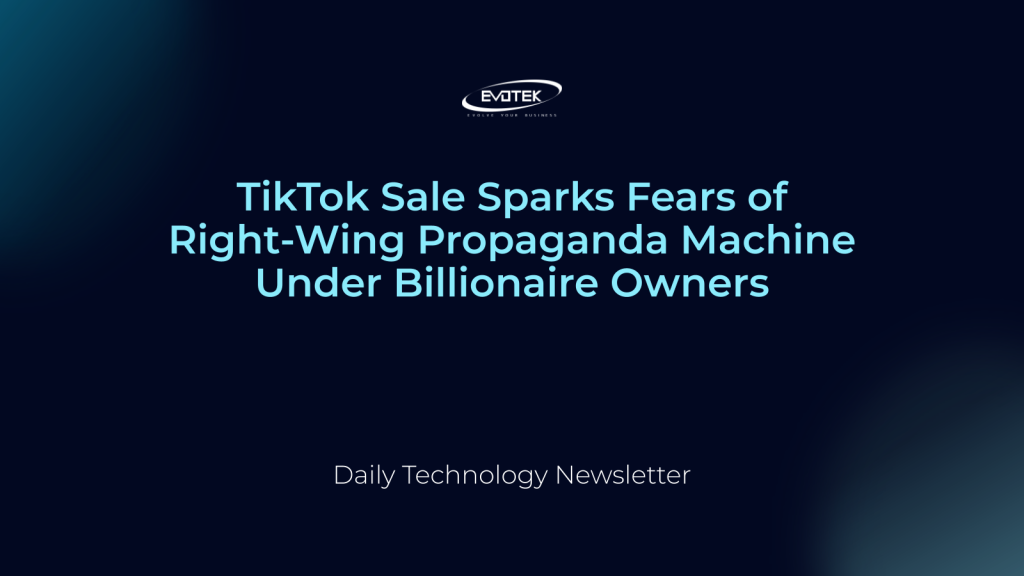After years of intense scrutiny regarding its implications for privacy, potential propaganda, and national security, popular short-form video platform TikTok is reportedly headed for a sale. The prospective buyers are a group of billionaires with close ties to former President Donald Trump, raising significant concerns that the platform could be transformed into a vehicle for right-wing political messaging.
This development follows widespread apprehension about TikTok’s original ownership, ByteDance. However, critics suggest that the new American ownership may introduce a different set of challenges, particularly regarding content neutrality and political influence. Some commentators even argue that the previous uproar from Democrats regarding the app inadvertently helped pave the way for this controversial acquisition.
Key Figures in the Potential Acquisition
Among the prominent figures expected to be involved in TikTok’s new ownership are:
- Rupert Murdoch: The media mogul behind Fox News, widely recognized for establishing one of the most impactful right-wing mass media platforms.
- Larry Ellison: Oracle co-founder and a staunch supporter of Donald Trump. Ellison is also reportedly expanding his media influence, particularly through CBS News, with involvement from his son and Bari Weiss.
The pattern of wealthy conservatives acquiring major media outlets and reshaping their editorial direction has been a noticeable trend, with platforms like Twitter (now X) under Elon Musk often cited as examples.
Trump’s “Joking” Remark on TikTok’s Future
The intent behind this acquisition became notably public when former President Trump, following an executive order to “save” TikTok, made a revealing comment. He reportedly “joked” about wanting to censor influencers and adjust the algorithm to ensure content was “100 percent MAGA.” While he later attempted to backtrack, insisting that “everyone is going to be treated fairly,” his initial statement fueled concerns among critics about a potential right-wing bias on the platform, drawing parallels to the transformation of Twitter after Musk’s takeover.
Regulatory Landscape and Future Implications
While ByteDance’s previous ownership faced scrutiny and attempted to comply with U.S. operational standards, the new domestic ownership structure could face fewer regulatory constraints. This situation is particularly alarming to those who believe privacy, national security, and fraud regulations have been weakened. Murdoch’s interest is seen by some as a strategic move to extend the reach of his existing media empire, particularly as its traditional audience ages. Ellison’s involvement, given his strong support for controversial political actions, suggests an aim to leverage TikTok as a new media channel for specific agendas.
The deal’s finalization is still pending, with ongoing discussions around legal requirements, including the Protecting Americans from Foreign Adversary Controlled Applications Act, and the precise ownership of TikTok’s core algorithm. These factors may present opportunities for activists and legal challenges to slow or alter the acquisition.
What Lies Ahead for TikTok?
If the acquisition proceeds, many predict that TikTok will eventually follow a trajectory similar to Twitter under Elon Musk’s leadership. There might be an initial period of minimal changes, lasting perhaps 6-12 months, to downplay any immediate shifts. However, the eventual pervasive use of the platform for right-wing propaganda is expected to become evident.
The underlying objective, according to some observers, has always been to populate the internet with “racist and corporatist right-wing agitprop,” disguised under claims of “conservative censorship” and calls for “antitrust reform.” Despite repeated warnings, the potential for this outcome remains a significant concern.
The hope that ethical users might abandon the platform en masse, or that innovative, more ethical alternatives might emerge, remains uncertain. The experience with Twitter/X, where even journalists continued their presence despite concerns over its ownership, suggests a user exodus is not guaranteed.
Challenges to Billionaire Domination
However, the success of such “domination plays” in mass media is not always assured. Historical examples like Rupert Murdoch’s acquisition of MySpace or AT&T’s attempts at video dominance serve as reminders that even well-funded strategies can falter. Oracle executives, for instance, lack extensive experience with consumer-facing product success or a deep understanding of modern media trends.
Defining “success” in this context is crucial. These billionaire architects possess vast financial resources, allowing them to fund “profit-losing propaganda ventures,” especially in a regulatory environment perceived as weakened. While their competency in execution might be questioned, the current precarious state of journalism and informed public consensus suggests that “emphatic alarmism” regarding these media consolidation efforts may be a justified response.

 日本語
日本語 한국어
한국어 Tiếng Việt
Tiếng Việt 简体中文
简体中文